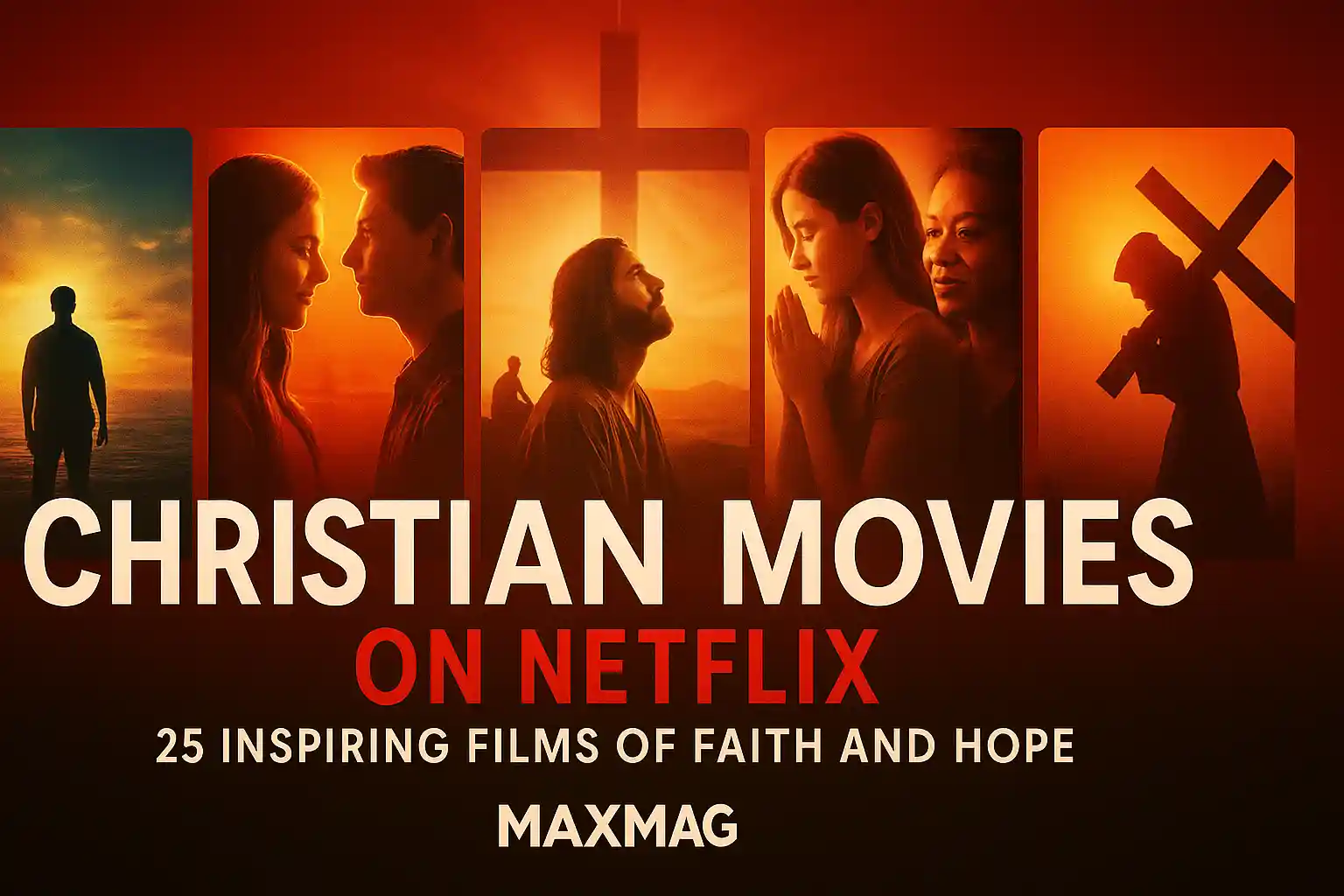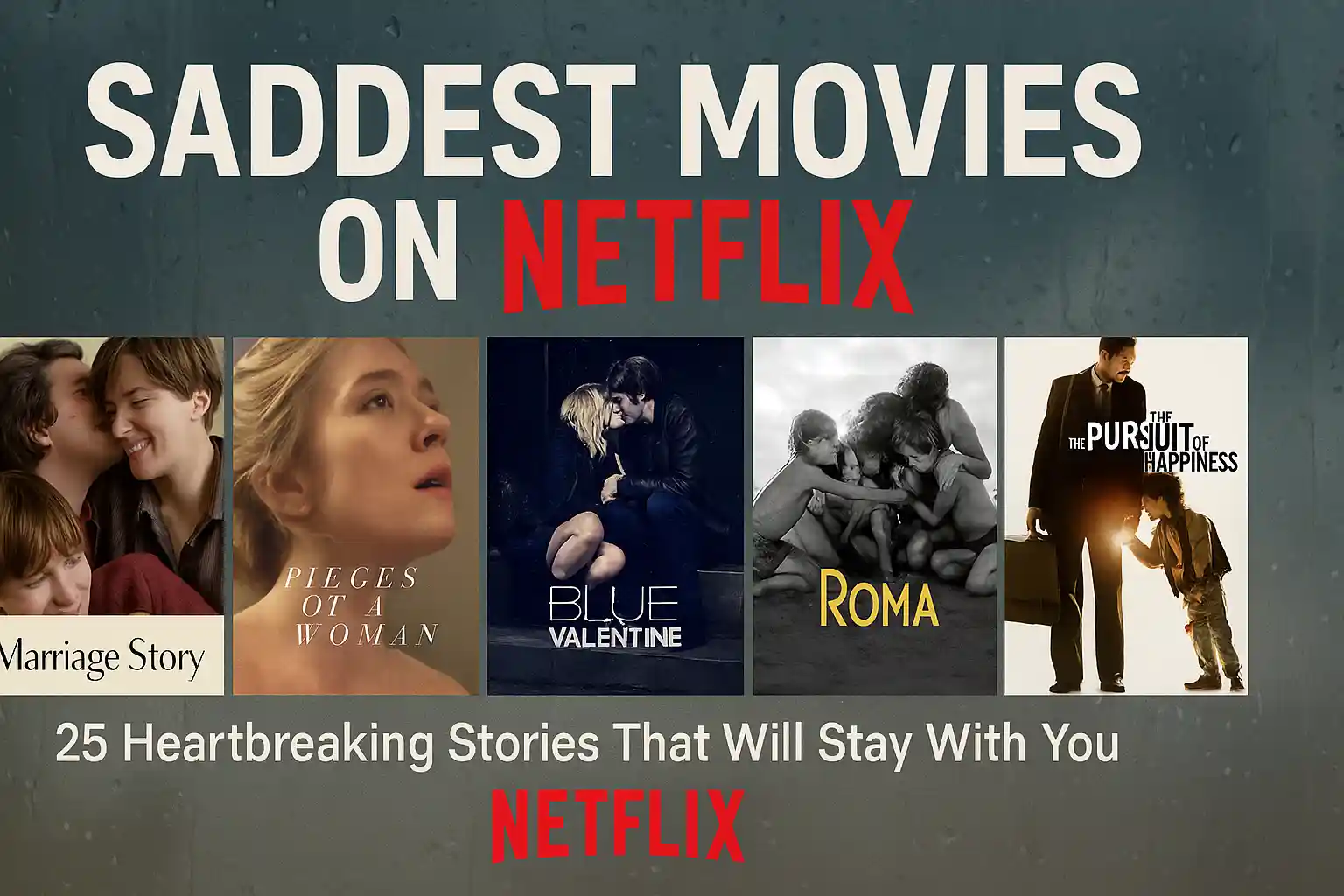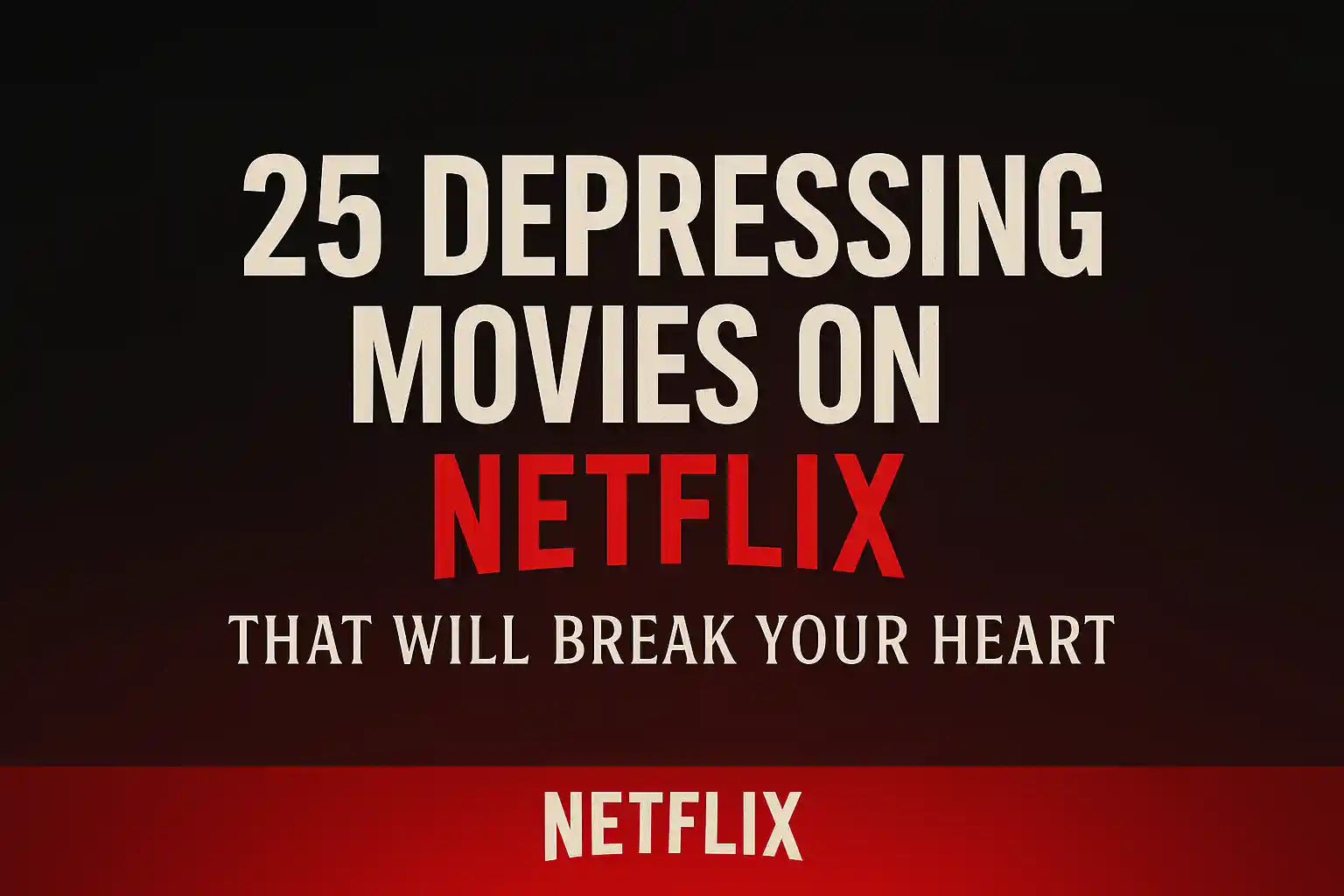
Netflix is not only a home for buzzy blockbusters and feel-good sitcoms; it also hosts a formidable catalog of films that stare directly into grief, guilt, trauma, and the aching loneliness of being human. If you’re searching for the most powerful depressing movies on Netflix, this long-form guide brings together 25 titles that wound and illuminate in equal measure. These works aren’t casual background viewing. They are films that demand quiet, patience, and the willingness to sit with difficult feelings—stories that linger in your chest long after the credits end. What unites them is not only sadness, but honesty: an insistence on confronting loss, addiction, war, mortality, and love’s slow unraveling with clarity and compassion.
The Best Depressing Movies on Netflix
1. Marriage Story (2019)
- Runtime: 137 min
- Starring: Scarlett Johansson, Adam Driver, Laura Dern
- Director: Noah Baumbach
- Genre: Drama
- IMDb Rating: 7.9/10
Noah Baumbach’s intimate heartbreaker follows a couple who once adored each other as they navigate a divorce that exposes every raw nerve. The film’s quiet devastations—missed glances, half-finished sentences, the small humiliations of legal strategy—accumulate into a portrait of love decaying under pressure. Adam Driver and Scarlett Johansson offer career-best work, finding the tenderness that still lives inside two people who cannot go on together. It’s depressing not because it’s cynical, but because it’s so honest about how good intentions collide with fear, pride, and exhaustion. By the final scenes, the film leaves you with tearful gratitude for what was, and a heavy awareness of what can’t be repaired. Few modern dramas render separation with this much empathy and sting.
2. Pieces of a Woman (2020)
- Runtime: 126 min
- Starring: Vanessa Kirby, Shia LaBeouf, Ellen Burstyn
- Director: Kornél Mundruczó
- Genre: Drama
- IMDb Rating: 7.1/10
Opening with a harrowing, near-unbroken birth sequence, this drama confronts the rupture of grief with startling immediacy. Vanessa Kirby’s performance is a study in internal fracture—watch how her posture, voice, and gaze change as the world around her keeps moving while hers has stopped. Family dynamics curdle; intimacy becomes impossible; blame looks for a home. The film refuses the neatness of “closure,” instead tracing a jagged path through sorrow as courtrooms, kitchens, and empty rooms turn into battlegrounds. It’s depressing because it understands that grief lives in the body and in time—appearing without warning and demanding witness. Yet, in tiny gestures and a late, fragile acceptance, it finds the outline of survival. You’ll feel wrung out, and strangely seen.
3. Requiem for a Dream (2000)
- Runtime: 102 min
- Starring: Ellen Burstyn, Jared Leto, Jennifer Connelly, Marlon Wayans
- Director: Darren Aronofsky
- Genre: Psychological Drama
- IMDb Rating: 8.3/10
Four people chase versions of happiness—thinner, richer, freer—and find the quicksand of addiction beneath their feet. Aronofsky’s sensory assault (split screens, rapid montages, needle-sharp sound design) mirrors the compulsions that lock his characters into diminishing returns. Ellen Burstyn’s turn as a lonely woman seduced by diet pills is an act of fearless exposure; the fluorescent hell of daytime TV becomes a shrine to delusion. By the final act, the film’s famous suite crescendos into one of cinema’s bleakest codas, where dignity, love, and bodily autonomy are stripped away. “Requiem” is depressing because it doesn’t look away—from the systems that profit off desperation or from the shame that keeps people silent. It’s a masterpiece many will never rewatch.
4. The Road (2009)
- Runtime: 111 min
- Starring: Viggo Mortensen, Kodi Smit-McPhee, Charlize Theron
- Director: John Hillcoat
- Genre: Post-Apocalyptic Drama
- IMDb Rating: 7.2/10
Cormac McCarthy’s ash-gray world arrives on screen as a landscape where color—and mercy—have largely died. A father and son push a shopping cart south, scavenging for calories and reasons to keep going. Viggo Mortensen’s gaunt devotion anchors the film, while Kodi Smit-McPhee embodies innocence besieged. Encounters with strangers are coin flips between cruelty and rare kindness; memory itself becomes a torment. The Road is depressing because it imagines not just the end of civilization but the erosion of stories, rituals, and trust. What persists is love so ferocious it becomes its own kind of agony. When a ray of human connection finally breaks through, it feels less like salvation than the faintest possible reprieve.
5. Blue Valentine (2010)
- Runtime: 112 min
- Starring: Ryan Gosling, Michelle Williams
- Director: Derek Cianfrance
- Genre: Romance, Drama
- IMDb Rating: 7.4/10
Love stories usually end before the rot sets in. “Blue Valentine” splices the courtship and the autopsy, inviting you to hold both at once—the butterflies and the bile. Gosling and Williams improvise their way toward a lived-in intimacy that curdles into resentment, exhaustion, and fear of the future. Cheap motel rooms, broken plans, and private jokes soured by time become the artifacts of a marriage losing oxygen. The film is depressing because it understands how love can fail without villains, how good people can be wrong for each other, and how compromise can quietly calcify into self-betrayal. Its final image is a funeral for what once felt inevitable and eternal. You might call it an anti-romance; it feels more like a mirror.
6. Schindler’s List (1993)
- Runtime: 195 min
- Starring: Liam Neeson, Ben Kingsley, Ralph Fiennes
- Director: Steven Spielberg
- Genre: Historical Drama, War
- IMDb Rating: 9.0/10
Spielberg’s black-and-white chronicle of the Holocaust is unendurable and indispensable. Through Oskar Schindler—a flawed man who becomes a lifeline for hundreds—humanity flickers against industrialized murder. The red-coat motif sears itself into memory; Fiennes’ sadism chills; the ghetto liquidation sequence crushes breath. “Schindler’s List” is depressing because it catalogues cruelty at scale while refusing the comfort of distance. Yet, it also insists on moral choice amid terror. The coda’s graveside ritual bridges cinema and history, asking us not just to remember but to reckon. Few films render the weight of witness with such clarity and sorrow.
7. The Pianist (2002)
- Runtime: 150 min
- Starring: Adrien Brody, Thomas Kretschmann, Emilia Fox
- Director: Roman Polanski
- Genre: Biography, War Drama
- IMDb Rating: 8.5/10
Władysław Szpilman survives not by heroism but by hiding, hunger, and terrible luck—an anti-myth that makes this Holocaust memoir feel brutally real. Brody’s gaunt silence becomes its own music; the piano recedes as survival consumes the self. Ruined apartments and gutted streets play like open wounds. “The Pianist” is depressing in the way truth often is: it shows how easily a life can be starved of dignity, how neighbors vanish, and how art must sometimes yield to the monotony of staying alive. A late exchange at a ruined instrument offers an ember of grace without absolution. You’ll leave shattered, deeply grateful, and profoundly unsettled.
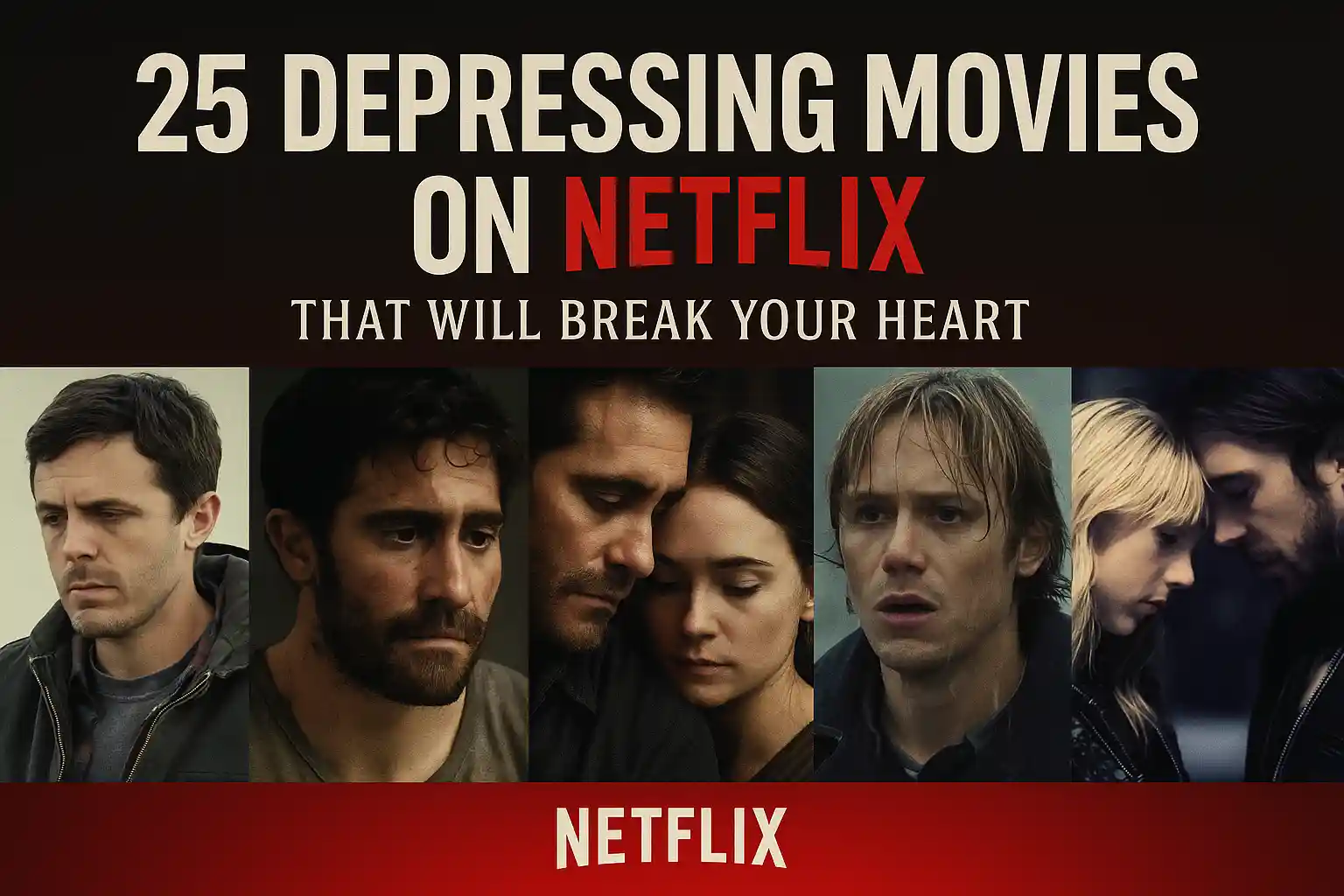
8. A Monster Calls (2016)
- Runtime: 108 min
- Starring: Lewis MacDougall, Felicity Jones, Sigourney Weaver, Liam Neeson (voice)
- Director: J.A. Bayona
- Genre: Fantasy Drama
- IMDb Rating: 7.5/10
Grief arrives early for some children, and Bayona treats that fact with reverence and imagination. A towering yew tree tells stories that refuse easy morals, pushing a boy to confess the ugliest, truest thing inside him. Watercolor sequences bloom and bleed; the mundane cruelty of school hallways grinds on. This is depressing because it admits that love cannot beat mortality, and that acceptance often looks like surrender. Yet it’s also tender, arguing that telling the truth about our pain is the first kindness we can offer ourselves. Bring tissues; bring patience; bring your younger self.
9. The Boy in the Striped Pajamas (2008)
- Runtime: 94 min
- Starring: Asa Butterfield, Vera Farmiga, David Thewlis
- Director: Mark Herman
- Genre: Historical Drama
- IMDb Rating: 7.7/10
Viewed through a child’s eyes, atrocity takes on its most treacherous form: it looks like normal life, fenced off and explained away. A forbidden friendship grows across barbed wire, each meeting an act of innocence that adults have forfeited. The film is depressing because its tragedy is both inevitable and preventable; the final sequence is as merciless as history. Ethical debates about perspective are valid, but the film’s emotional impact is undeniable. It lingers as a warning about ignorance, euphemism, and the seductive orderliness of evil.
10. All Quiet on the Western Front (2022)
- Runtime: 147 min
- Starring: Felix Kammerer, Albrecht Schuch, Daniel Brühl
- Director: Edward Berger
- Genre: War, Drama
- IMDb Rating: 7.8/10
This German adaptation grinds the machinery of World War I into the faces of boys who believed in glory. Mud, exhaust, and churned flesh become the film’s palette; hope is rationed and routinely confiscated. Trench assaults are filmed with a clinical, suffocating intensity that exposes war’s logistics of waste. Political negotiations off the field reveal a second cruelty: the measured, bureaucratic pace of decisions that cost thousands of lives. Depressing, yes—but purposefully so, an inoculation against romanticism. When the guns fall silent, the silence indicts everyone who stoked the noise.
11. The Power of the Dog (2021)
- Runtime: 126 min
- Starring: Benedict Cumberbatch, Kirsten Dunst, Kodi Smit-McPhee, Jesse Plemons
- Director: Jane Campion
- Genre: Psychological Western, Drama
- IMDb Rating: 6.8/10
Masculinity curdles into menace on a lonely Montana ranch, where humiliation is a language and tenderness a liability. Campion’s slow burn tightens around four brittle souls until a single gesture snaps everything out of place. Cumberbatch’s Phil is terrifying not because he’s loud, but because he knows where people keep their softest parts. The film is depressing in its anatomy of power—how shame migrates, how love becomes a weapon, how cruelty can feel like safety to the wounded. Its ending lands like a whisper with the force of a storm, leaving you to sift through the moral wreckage.
12. Roma (2018)
- Runtime: 135 min
- Starring: Yalitza Aparicio, Marina de Tavira
- Director: Alfonso Cuarón
- Genre: Drama
- IMDb Rating: 7.7/10
Cuarón’s luminous, black-and-white memory piece centers a domestic worker whose quiet competence holds a family together as it falls apart. The film’s grandeur—operatic set pieces, meticulous compositions—never loses sight of Cleo’s inner weather: obligation, grief, and a love that can’t protect her from class and gender’s cold facts. “Roma” is depressing because it maps the fragility of ordinary happiness and the invisibility of the people who make it possible. Yet its final moments carry a soft, aching dignity, as if to say survival is its own epic when no one is watching. It’s a lullaby sung through tears.
13. Beasts of No Nation (2015)
- Runtime: 137 min
- Starring: Abraham Attah, Idris Elba
- Director: Cary Joji Fukunaga
- Genre: War Drama
- IMDb Rating: 7.7/10
Childhood is conscripted at gunpoint in this searing story of a boy absorbed into a militia. Fukunaga renders the seductions and brutalities of power with unbearable intimacy; Idris Elba’s commandant terrifies not just through violence but through twisted paternal charisma. The film is depressing because it shows what happens when the architecture of care collapses and is replaced by ritualized harm. Abraham Attah’s performance refuses pity, offering a soul that keeps flickering even as the frame fills with smoke. By the end, the cost of returning to ordinary life feels incalculable—and necessary.
14. I’m Thinking of Ending Things (2020)
- Runtime: 134 min
- Starring: Jessie Buckley, Jesse Plemons, Toni Collette, David Thewlis
- Director: Charlie Kaufman
- Genre: Psychological Drama
- IMDb Rating: 6.6/10
A snowbound visit to the boyfriend’s parents’ house becomes a hall of mirrors where time, memory, and self dissolve. Kaufman’s adaptation is depressing in a uniquely existential key: it suggests that loneliness can become a worldview, that the stories we tell about ourselves can trap us as surely as they protect us. Buckley and Plemons oscillate between intimacy and alienation; the basement hums with secrets. It’s a film of uncomfortable questions and few answers, a slow drift into the melancholy of unrealized life. If you’ve ever feared that your best has already passed, this will find you.
15. The Devil All the Time (2020)
- Runtime: 138 min
- Starring: Tom Holland, Robert Pattinson, Riley Keough, Sebastian Stan
- Director: Antonio Campos
- Genre: Crime Drama
- IMDb Rating: 7.1/10
In this Appalachian gothic, faith curdles into deception and violence across generations. Preachers, drifters, and lawmen orbit a boy who learns early that righteousness and cruelty are often indistinguishable in the wrong hands. Campos’ storytelling is depressing because it regards trauma not as an event but as a climate—handed down, normalized, baptized. Tom Holland’s quiet intensity offers a thin line of decency in a world that keeps daring him to snap it. You’ll feel coated in moral grime, with only a small patch of sky visible by the end.
16. The Unforgivable (2021)
- Runtime: 112 min
- Starring: Sandra Bullock, Viola Davis, Vincent D’Onofrio
- Director: Nora Fingscheidt
- Genre: Drama, Crime
- IMDb Rating: 7.1/10
Fresh out of prison after a violent crime, a woman tries to reassemble a life that has turned its back on her. Bullock wears the weight of years like a physical deformity; every room seems to shrink around her. The film is depressing because it understands that punishment rarely ends at release—the stigma, the bureaucracy, and the fractured families persist. Yet it also interrogates the violence of memory: what we do to keep it alive, what we do to bury it, and who gets to decide which version stands. The title poses a question; the movie refuses to answer it cleanly.
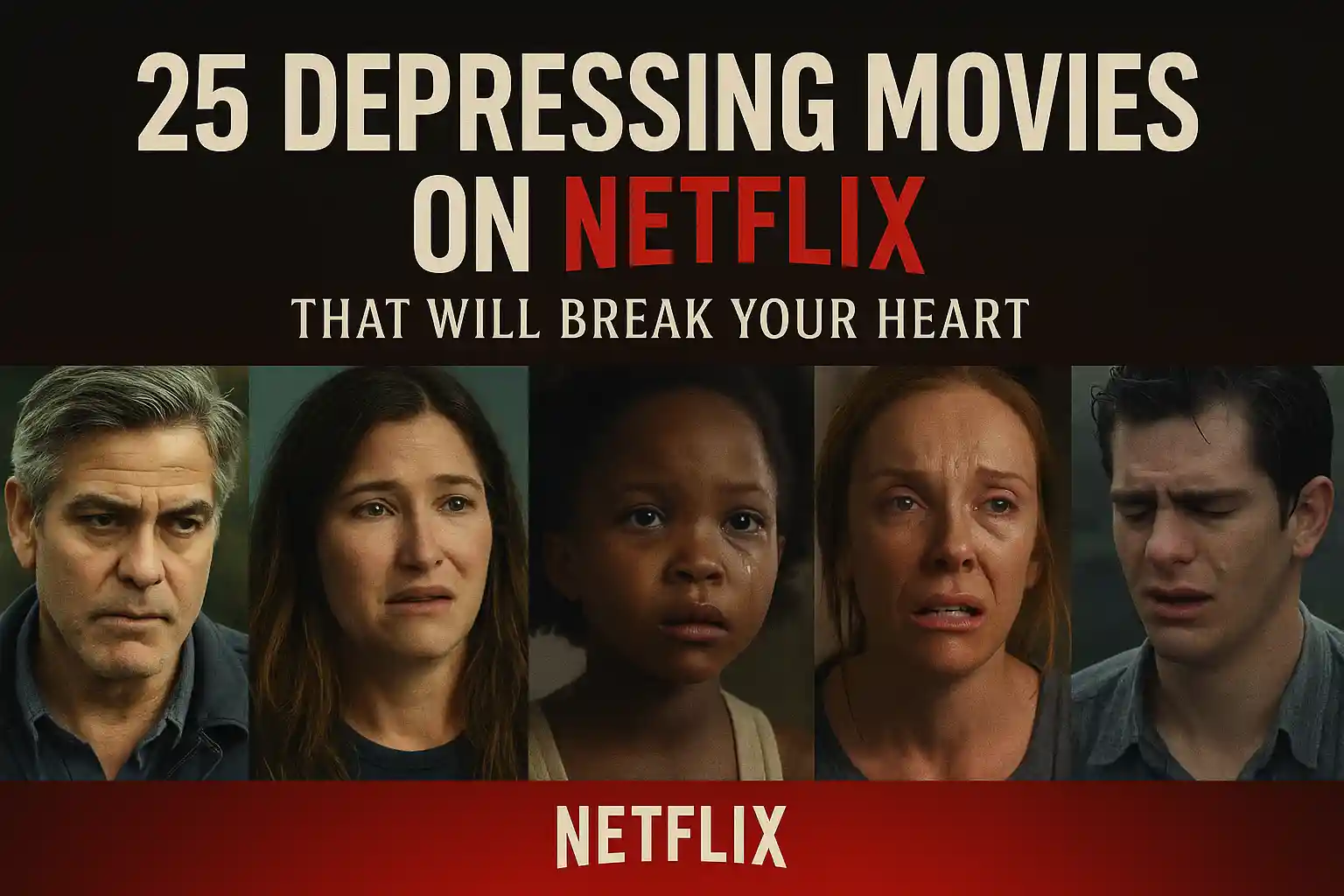
17. The Lost Daughter (2021)
- Runtime: 121 min
- Starring: Olivia Colman, Jessie Buckley, Dakota Johnson, Ed Harris
- Director: Maggie Gyllenhaal
- Genre: Psychological Drama
- IMDb Rating: 6.7/10
Maternal ambivalence is one of culture’s last taboos, and this taut adaptation names it without apology. On a sunlit vacation, a professor’s past decisions haunt her into petty thefts, prickly encounters, and mounting dread. Colman and Buckley play the same woman at different times—both brilliant, exhausted, and hungry for oxygen. The film is depressing because it claims that love is not the same as self-erasure and that choosing the self can leave a wound that never scars flat. Beach towels and doll eyes become talismans of regret. The sea looks beautiful; it isn’t soothing.
18. First They Killed My Father (2017)
- Runtime: 136 min
- Starring: Sareum Srey Moch, Phoeung Kompheak
- Director: Angelina Jolie
- Genre: Biographical War Drama
- IMDb Rating: 7.2/10
Adapted from Loung Ung’s memoir, this film tracks a child’s endurance under the Khmer Rouge regime. Jolie’s direction keeps the camera low, tethered to a little girl’s point of view where ideology registers as hunger, separation, and the sound of boots. It’s depressing because it refuses abstraction—every statistic is a sibling, a parent, a neighbor. The beauty of Cambodia’s landscapes makes the violence feel even more obscene. When the war loosens its grip, the body still remembers. The film honors that memory without exploiting it, leaving viewers humbled and hollowed out.
19. All the Bright Places (2020)
- Runtime: 108 min
- Starring: Elle Fanning, Justice Smith
- Director: Brett Haley
- Genre: Teen Drama, Romance
- IMDb Rating: 6.5/10
Teen grief meets fragile first love in a Midwestern town mapped by secrets and scenic detours. The film takes mental health seriously, keeping the focus on the daily disciplines of survival rather than on grand gestures. It’s depressing because it admits that love cannot fix an illness and that some goodbyes arrive even when you’ve done everything “right.” Fanning and Smith find a gentle chemistry that makes the hurt sharper. Teachers, parents, and friends try, falter, and try again. By the end, remembrance becomes a practice—one that still aches.
20. To the Bone (2017)
- Runtime: 107 min
- Starring: Lily Collins, Keanu Reeves, Carrie Preston
- Director: Marti Noxon
- Genre: Drama
- IMDb Rating: 6.8/10
Eating disorders are often sensationalized on screen; “To the Bone” chooses frankness over spectacle. Lily Collins brings brittle humor and bone-deep weariness to a young woman circling her illness’s gravitational pull. Group therapy scenes reveal the different faces of the same hunger—for control, for invisibility, for relief. The film is depressing because progress comes in inches, and relapses lurk like reflexes. Yet there’s grace here, too, in chosen families, in blunt kindness, in the stubborn belief that people can change without becoming someone else. It’s empathetic, not tidy.
21. Paddleton (2019)
- Runtime: 89 min
- Starring: Mark Duplass, Ray Romano
- Director: Alex Lehmann
- Genre: Dramedy
- IMDb Rating: 7.1/10
Two awkward neighbors share a thrift-store sport, microwave pizzas, and a terminal diagnosis. What sounds small becomes enormous as the friends road-trip toward an ending one of them has chosen. Romano and Duplass craft a friendship so specific it feels archetypal: all the jokes that are really love notes, all the silences that are really fear. The film is depressing because it treats autonomy with the seriousness it deserves and asks what loyalty looks like when the future has a date. It finds humor in strange places, and sorrow in the ordinary kindness of doing exactly what a friend asks.
22. A Sun (2019)
- Runtime: 155 min
- Starring: Chien-Ho Wu, Yi-Wen Chen, Samantha Shu-Chen Ko
- Director: Mong-Hong Chung
- Genre: Family Drama
- IMDb Rating: 7.6/10
This Taiwanese epic dissects a family’s fault lines after a violent incident sends one son to juvenile detention and pulls the other into the undertow of expectation. Light and shadow are visual motifs, but they’re also moral states; the film traces how shame travels between rooms and generations. It’s depressing because forgiveness arrives late, partial, and at a price. Yet it also honors small mercies: a meal shared, a door left open, a father finally speaking the right words. Few films balance scope and intimacy with this much control and ache.
23. System Crasher (2019)
- Runtime: 118 min
- Starring: Helena Zengel, Albrecht Schuch
- Director: Nora Fingscheidt
- Genre: Social Drama
- IMDb Rating: 7.8/10
An explosive nine-year-old pinballs through Germany’s care systems, too volatile for each new placement and too young for the institutions built to contain her. Zengel’s performance is a livewire—terrifying, magnetic, heartbreaking. The film is depressing because it shows how structures intended to protect can also exhaust, misplace, and abandon the children who need them most. Compassionate adults try everything; it isn’t enough. Fingscheidt refuses feel-good shortcuts, insisting on the complexity of trauma and the limits of expertise. The final moments hover between dread and fragile hope, as honest as they are unresolved.
24. The Platform (2019)
- Runtime: 94 min
- Starring: Iván Massagué, Zorion Eguileor, Antonia San Juan
- Director: Galder Gaztelu-Urrutia
- Genre: Sci-Fi, Thriller, Satire
- IMDb Rating: 7.0/10
A vertical prison lowers a feast one level at a time; those above gorge, those below starve. Subtlety is not the point—this is a parable with a knife in its teeth. The Platform is depressing because it recognizes that scarcity is often engineered and that appeals to fairness collapse without shared obligation. Violence, ideology, and appetite circle each other like predators. The film’s bleak humor and splatterhouse shocks don’t blunt its despairing thesis: we could all eat if we chose to. We don’t. The final image is a riddle and an indictment.
25. Never Let Me Go (2010)
- Runtime: 103 min
- Starring: Carey Mulligan, Andrew Garfield, Keira Knightley
- Director: Mark Romanek
- Genre: Dystopian Romance, Drama
- IMDb Rating: 7.1/10
Kazuo Ishiguro’s melancholy fable becomes a whisper-quiet tragedy about youth spent under a terrible destiny. Love triangles and boarding-school rituals unfold in soft light, masking a system that harvests bodies with bureaucratic calm. The film is depressing because it explores how acceptance, politeness, and longing can conspire to keep people docile in the face of the unforgivable. Mulligan’s narration aches with retrospection; small rebellions wilt under the clock’s steady hand. It’s a love story set inside a machine, and the machine wins. What remains is memory, and a question: what counts as a full life?
Conclusion: The Enduring Pull of Depressing Movies on Netflix
The 25 titles above chart the full topography of sorrow on screen—private griefs, public catastrophes, and the quieter devastations that unfold behind closed doors. The most resonant depressing movies on Netflix are valuable not because they wallow in misery, but because they sharpen our moral attention. They slow us down long enough to notice who gets overlooked in a crisis, how systems entrench harm, and where the thin cords of care still hold. If these films usher us into difficult rooms, they also teach us how to sit with pain without turning away, how to name what hurts, and how to keep extending empathy when quick fixes fail.
Use them as tools, not just experiences. Watch actively—pause, take notes, look up the history they reference, and talk with someone afterward. Let patterns emerge: the way shame is inherited, how scarcity is engineered, how love survives in small, unfancy gestures. For deeper context and craft analysis, explore long-form criticism from The New York Times film desk and archival essays at RogerEbert.com; both illuminate how filmmakers turn grief, trauma, and memory into language we can understand.
Finally, carry what you learn offscreen. Let these stories nudge you toward checking on a friend who’s gone quiet, donating to a hotline, or simply listening without rushing to solutions. Art alone can’t repair what’s broken, but it can widen the space in which repair becomes possible. That’s the real gift of these films: they are rehearsals for compassion—demanding, exhausting, and, in the end, deeply humane.





